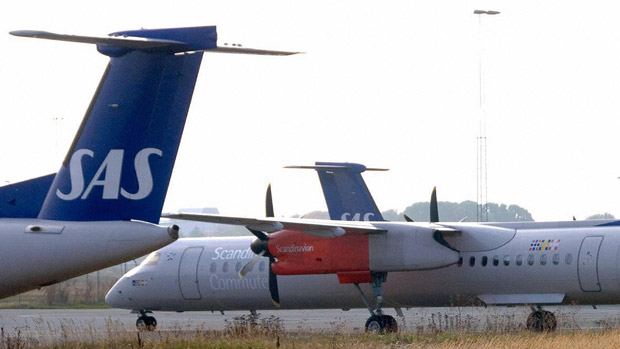Russian military jet in 'near miss' with passenger plane
Near collision over Baltic Sea is latest in rising tide of close encounters between Russia and the West

A free daily email with the biggest news stories of the day – and the best features from TheWeek.com
You are now subscribed
Your newsletter sign-up was successful
A Russian intelligence jet nearly collided with a passenger plane belonging to the Scandinavian airline SAS over the Baltic Sea last week, according to Swedish officials.
The commercial flight, taking off from Copenhagen airport on Friday, was ordered to change course as soon as the military plane was detected, said Sweden's defence minister Peter Hultqvist.
The Russian plane had allegedly turned off its transponders in order to avoid commercial radar, which Hultqvist said was "serious, inappropriate and downright dangerous".
The Week
Escape your echo chamber. Get the facts behind the news, plus analysis from multiple perspectives.

Sign up for The Week's Free Newsletters
From our morning news briefing to a weekly Good News Newsletter, get the best of The Week delivered directly to your inbox.
From our morning news briefing to a weekly Good News Newsletter, get the best of The Week delivered directly to your inbox.
He told reporters: "It is remarkable and very serious. There is a risk of accidents that could ultimately lead to deaths."
However, Major General Igor Konashenkov, a spokesman for the Russian defence ministry, said the two planes were never less than 42 miles apart.
Konashenkov said the military plane had been complying with the rules and was at a safe distance from civilian air passenger routes, reports The Independent.
"There were no prerequisites for an air accident," he said in a statement.
A free daily email with the biggest news stories of the day – and the best features from TheWeek.com
The incident comes after Finland's aviation authorities had to order a civilian aircraft to change course last week to avoid a group of Russian military aircraft flying over the Baltic Sea without their transponders on.
In another more serious incident in March, a Russian plane – again without transponders – was said to have come within 100 metres of an SAS plane outside Copenhagen.
The West has accused Russia of increasing its military presence in the area amid tensions over Ukraine, while Russia has accused Nato of upping its air patrols along Russian borders. Estonia, Latvia, Poland and Lithuania have all raised concerns about the situation in the Baltic Sea.
Nato officials indicated in late October that its states had already conducted over 100 intercepts of Russian aircraft this year, three times more than in 2013.
A report by London-based think tank, the European Leadership Network, said there had been a rise in close military encounters between Russia and the West this year, including "violations of national airspace, emergency scrambles, narrowly avoided mid-air collisions, close encounters at sea, simulated attack runs and other dangerous actions happening on a regular basis over a very wide geographical area".
-
 The 8 best TV shows of the 1960s
The 8 best TV shows of the 1960sThe standout shows of this decade take viewers from outer space to the Wild West
-
 Microdramas are booming
Microdramas are boomingUnder the radar Scroll to watch a whole movie
-
 The Olympic timekeepers keeping the Games on track
The Olympic timekeepers keeping the Games on trackUnder the Radar Swiss watchmaking giant Omega has been at the finish line of every Olympic Games for nearly 100 years
-
 Epstein files topple law CEO, roil UK government
Epstein files topple law CEO, roil UK governmentSpeed Read Peter Mandelson, Britain’s former ambassador to the US, is caught up in the scandal
-
 Iran and US prepare to meet after skirmishes
Iran and US prepare to meet after skirmishesSpeed Read The incident comes amid heightened tensions in the Middle East
-
 Israel retrieves final hostage’s body from Gaza
Israel retrieves final hostage’s body from GazaSpeed Read The 24-year-old police officer was killed during the initial Hamas attack
-
 China’s Xi targets top general in growing purge
China’s Xi targets top general in growing purgeSpeed Read Zhang Youxia is being investigated over ‘grave violations’ of the law
-
 Panama and Canada are negotiating over a crucial copper mine
Panama and Canada are negotiating over a crucial copper mineIn the Spotlight Panama is set to make a final decision on the mine this summer
-
 Why Greenland’s natural resources are nearly impossible to mine
Why Greenland’s natural resources are nearly impossible to mineThe Explainer The country’s natural landscape makes the task extremely difficult
-
 Iran cuts internet as protests escalate
Iran cuts internet as protests escalateSpeed Reada Government buildings across the country have been set on fire
-
 US nabs ‘shadow’ tanker claimed by Russia
US nabs ‘shadow’ tanker claimed by RussiaSpeed Read The ship was one of two vessels seized by the US military